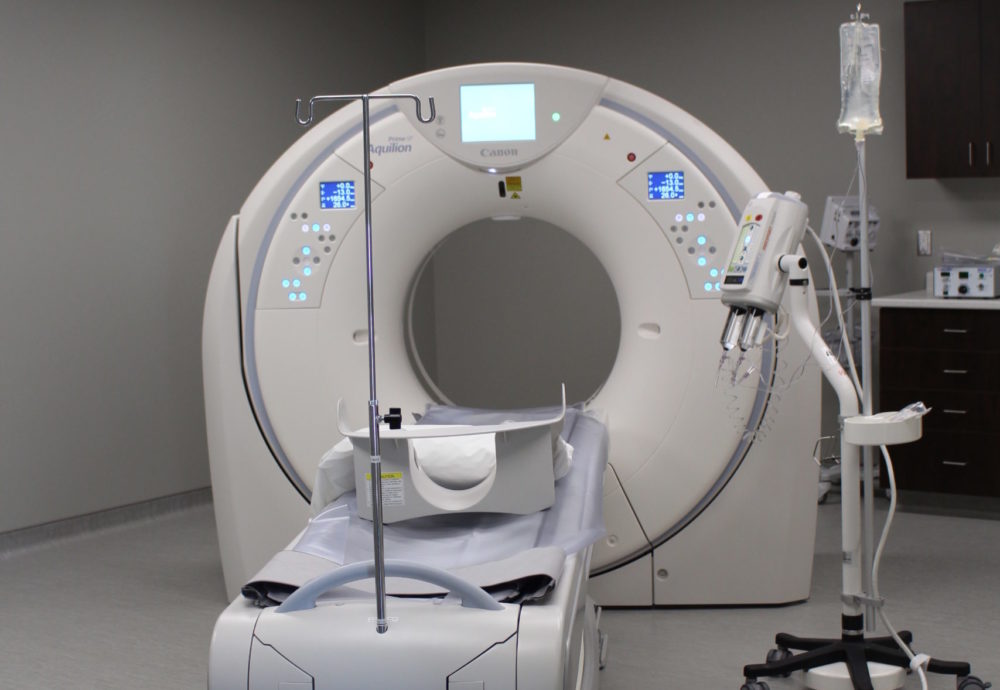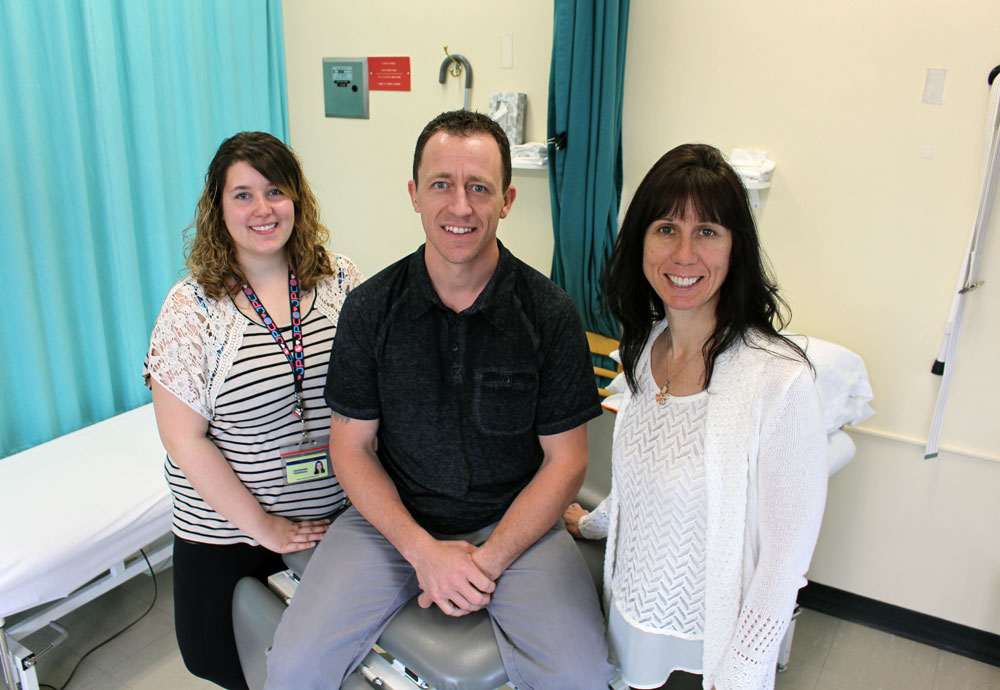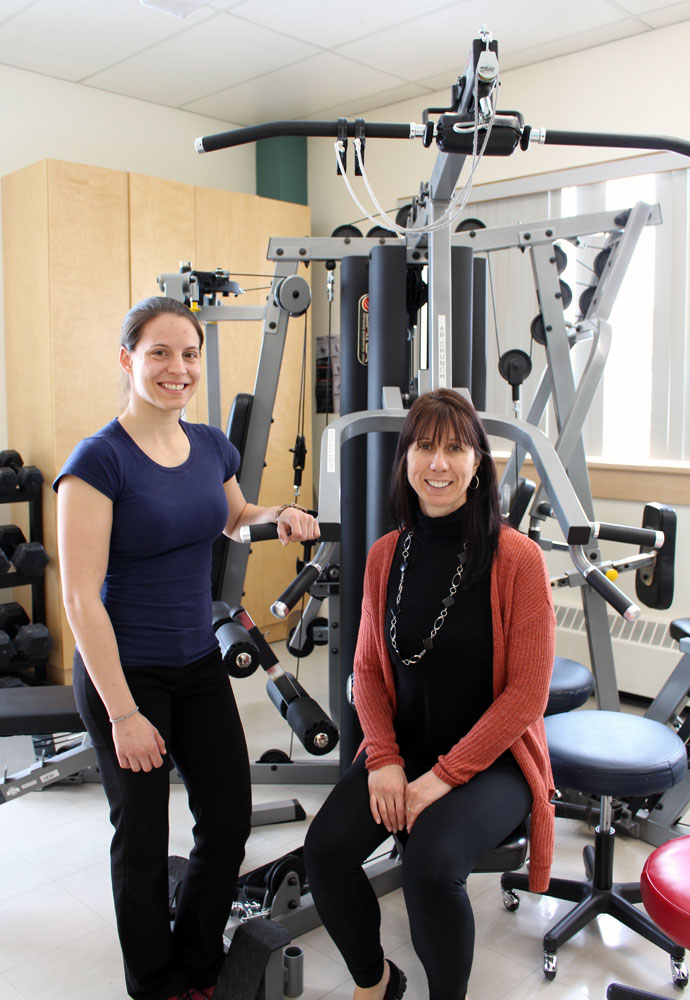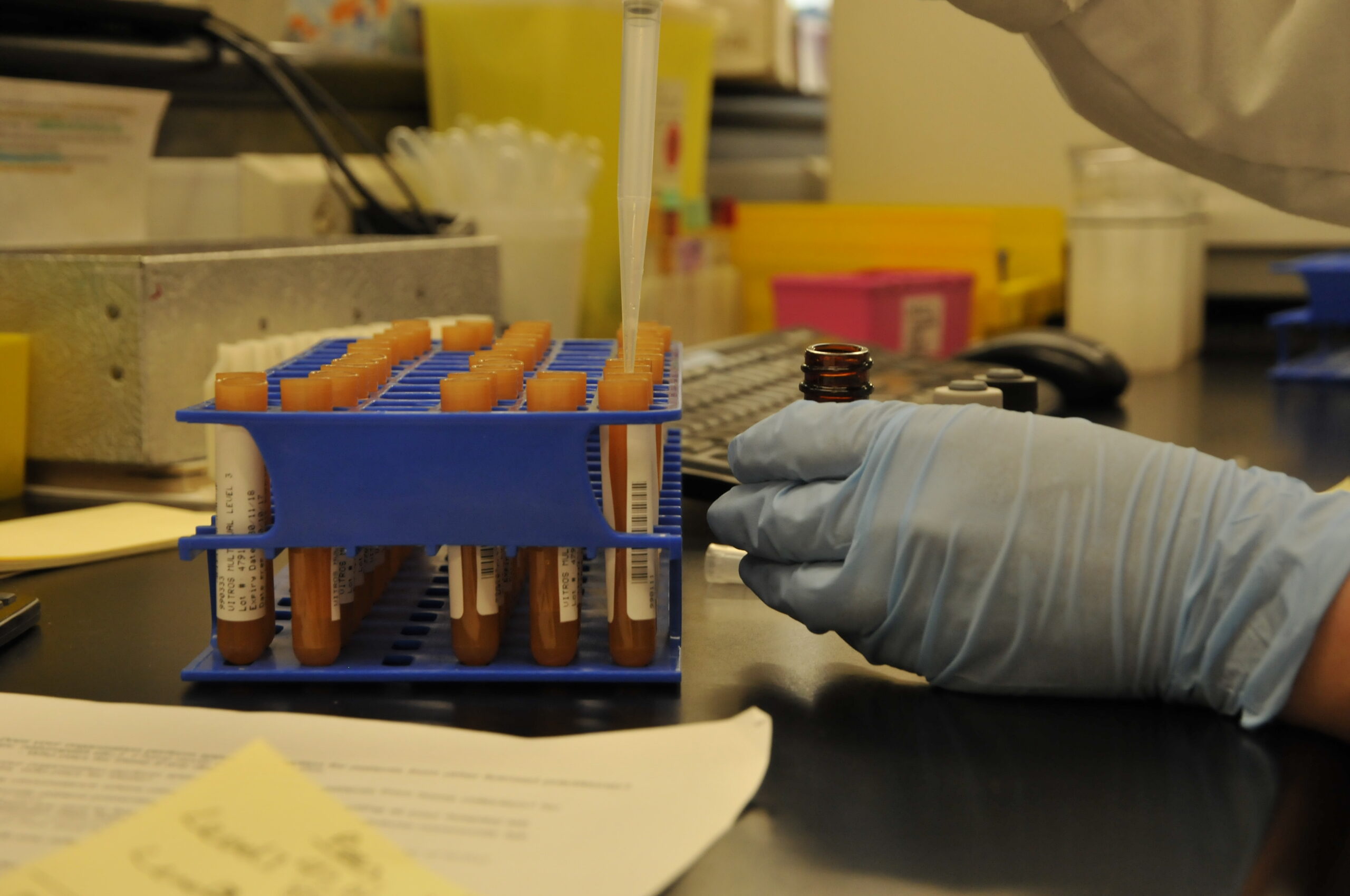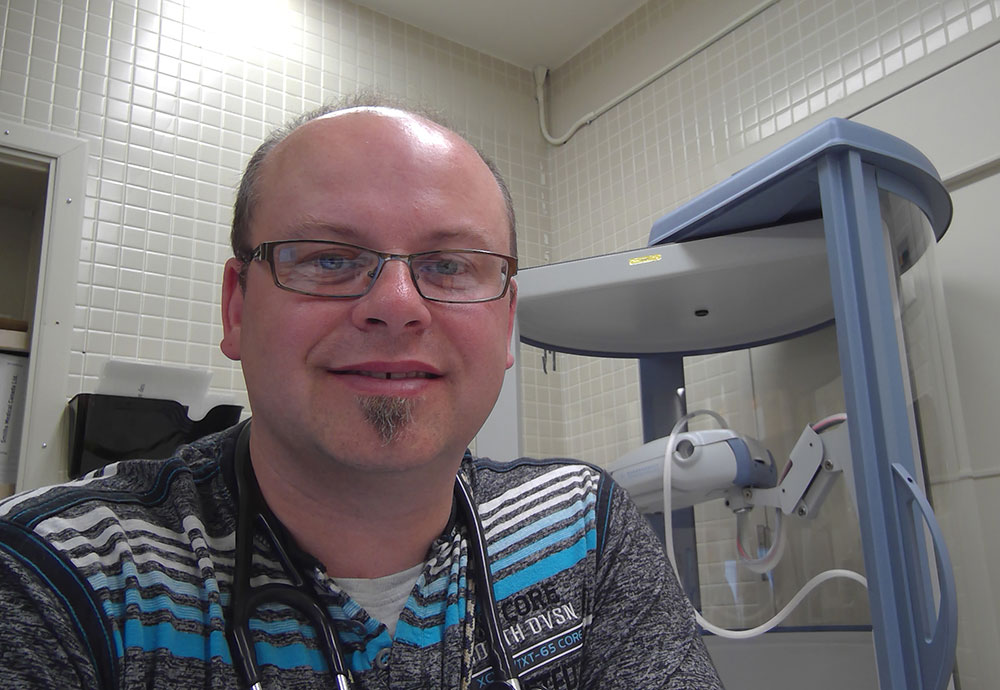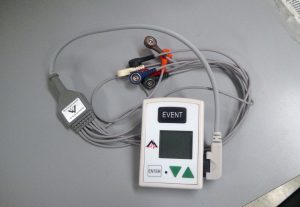Programs & Services
DIAGNOSTIC & THERAPEUTIC SERVICES
We provide a full range of exams and screening tests for inpatients and outpatients, using state-of-the-art equipment. Services include X-ray, mammography, ultrasound, respiratory, physiotherapy, laboratory and soon to be, a CT Scan.
Mammography
Hôpital Notre-Dame Hospital’s Medical Imaging Department consists of x-ray, ultrasound, mammography, Ontario Breast Screening (OBSP) and a CT scan along with support services such as picture archiving and communication systems delivering images instantly to our radiologists and physicians.
Patients benefit from medical imaging services that combine talented medical professionals and contemporary equipment.
Ultrasound
Hôpital Notre-Dame Hospital’s Medical Imaging Department consists of x-ray, ultrasound, mammography, Ontario Breast Screening (OBSP) and a CT scan along with support services such as picture archiving and communication systems delivering images instantly to our radiologists and physicians.
Patients benefit from medical imaging services that combine talented medical professionals and contemporary equipment.
CT Scan
Hôpital Notre-Dame Hospital’s Medical Imaging Department consists of x-ray, ultrasound, mammography, Ontario Breast Screening (OBSP) and a CT scan along with support services such as picture archiving and communication systems delivering images instantly to our radiologists and physicians.
Patients benefit from medical imaging services that combine talented medical professionals and contemporary equipment.
Physiotherapy
Physiotherapists work with individuals of all ages to break down the barriers to physical function. Our team members consist of physiotherapists and a physiotherapy assistant. We work with outpatients and inpatients, as well as offer services to the North East LHIN Home and Community Care and other external agencies.
The clinic is registered with the WSIB of Ontario and the Health Claims for Auto Insurance – HCAI. A doctor’s referral is required for the publicly funded program, but not for other patients that can self refer.
Services Offered
- Evaluation and management of injuries:
- Manual therapy
- Condition-specific exercise programs
- Posture correction
- Education/teaching/training on proper body mechanics
- Acupuncture treatments
- Use of modalities (IFC, Ultrasound, Laser, Heat/cold, TENS, Traction)
- Tissue Distraction Release with silicone cups
- Crutch adjustment/walking patterns/stair training
- Multifunctional gym and various cardio equipment
- Walker assessment
- Work site ergonomic evaluations
Laboratory
Our laboratory consists of Core Lab (Hematology, Biochemistry, Transfusion Medicine), Microbiology, and Laboratory Specimen Procurement and Dispatch (Central Receiving/Phlebotomy).
Inpatients and registered outpatients receive quality laboratory services through our Department of Laboratory Services at Notre-Dame Hospital.
Hôpital Notre-Dame Hospital provides laboratory support services for health care providers in various ways.
Test Ordering Process
REQUISITIONS:
All patient specimens must be accompanied by a fully completed, signed requisition form.
- The Ontario Ministry of Health and Long Term Care Requisition Form.
- Ministry of Health and Long Term Care requisition essential information.
- All patient specimens requiring testing from Public Health Laboratories must be accompanied by a fully complete PHL requisition form.
- Please refer to the Public Health Laboratory website for specimen collection and handling instructions, and PHL requisition completion instructions.
- The names on the requisition and the specimen container must match exactly; any unlabelled specimens received will NOT be processed.
- The specimen container should be labelled with
- Patient’s name,
- A second identifier (such as health card number or date of birth),
- Date and time collected
- Name of person who collected the specimen.
- All cytology and histology samples must be accompanied by a completed cytology or histology requisition. Please call 705-372-2935 to obtain a copy.
REPEAT TESTING | STANDING ORDERS:
Repeat testing/Standing order testing for individual patients can be requested for a period of up to 1 year without further documentation.
Test Information
PERFORMED AT THE HOPITAL NOTRE-DAME HOSPITAL:
OHIP UNINSURED TESTS
The Ontario Health Insurance Plan (OHIP) covers the cost of most laboratory tests, however there are some specialized non-routine tests that are deemed uninsured. Payment for these tests is required at Registration before the collection will be taken. View the list of most common uninsured tests.
Resulting Priorities
All the Hôpital Notre-Dame Hospital Laboratory test result reports are computer generated. The format is specifically designed to flag any results outside the reference interval.
The Notre-Dame Hospital Laboratory shall report all critical results immediately to the clinical personnel responsible for patient care 24 hours a day, 7 days a week.
Most noncritical routine test results are available within 24 hours; others require more complex testing or may have to be sent to a reference laboratory. These results can take several days to weeks to report.
Licensing & Accreditation
Supplies
Notre-Dame Hospital will provide supplies and containers required for the collection of laboratory specimens referred to Notre-Dame Hospital Laboratory.
Notre-Dame Hospital provides laboratory services for inpatients and registered outpatients.
Collection of Services Outside Notre-Dame Hospital
Outpatients who live in the Constance Lake area can have their specimens collected at the Jane Mattinas Clinic. Patients who live in the Mattice area can have their specimens collected at the Mattice Clinic.
Patient Instruction Sheets
Frequently Asked Questions
How do I prepare for the test? Can I eat before the test?
In order for your physician to interpret certain test results accurately, you may be asked to fast (not eating any food or drinking any liquids except water for several hours or even overnight). This is because the levels of some analytes become elevated in the bloodstream after eating and fluctuate depending on when you have eaten or the amount of food consumed. When you fast these variations are eliminated. In addition to fasting you may be asked abstain from caffeine or nicotine, physical activity or specific foods.
It is strongly suggested that you ask your physician at the time of your visit, if there are any special instructions.
Should I take my medication before the test?
Take your medication unless:
- your doctor tells you not to,
OR
- your test includes measurement of the medication level (for example, a digoxin level). In this case:
- Do not take your medication before arriving for the blood test;
- You will be asked for the time you last took your dose of medication;
- You may be asked when your next dose is due to be taken.
What should I take with me to the lab?
When visiting the Laboratory, you should bring the following information with you:
- a completed and signed test requisition form(s) from your health care provider requesting laboratory testing
- your provincial Health Card; and
- if requested by your health care provider, any specimens that you were required to collect at home.
I have been asked to collect a sample at home. What procedure do I follow?
If you have been asked to collect a specimen at home, please refer to the Patient’s Instructions area of our website for complete collection instructions of stool, urine and other specimens for testing.
Note: If you do not require blood collection, you may drop off specimens Monday to Friday, from 7:45 a.m. to 4:00 p.m. If no one is at the window, press on the blue button next to the Lab window for service.
Why has my doctor ordered these lab tests?
Laboratory tests are ordered for many different reasons. Perhaps because of a concern you have reported to your doctor, to check an existing condition or to monitor prescribed medication. These are just a few of the reasons your doctor may order lab tests.
Do I have to pay for my laboratory tests?
The Ontario Health Insurance Plan (OHIP) covers most laboratory tests; however there are some specialized, non-routine tests that are not covered. Notre-Dame Hospital is not funded for these tests therefore a billing policy has been implemented. Here is the list of non-insured tests: https://www.ndh.on.ca/wp-content/uploads/2020/09/Non-Insured-Tests-Apr-1-2020-e.pdf (prices are subject to change).
If my health care providers orders an uninsured test, do I have to have it done?
You do have the right to refuse to have the test done. However we recommend that you make that decision in consultation with your health care provider.
Can the cost of my test be reimbursed by my supplemental health insurance?
Every insurance plan is different. Contact your insurance provider to be sure.
How can I pay for my test?
At Notre-Dame Hospital, we accept Cash, Cheque, Visa, MasterCard, Debit and Money Order. Payment is required before the test can be completed.
How long will my lab visit take?
We do our best to make sure that patients are served in a timely manner. Patients are processed numerically to preserve confidentiality, but not necessarily in numerical order. Outpatients are processed on a first-come, first-serve basis.
Will the blood collection process hurt?
Our Lab staff is professionally trained to ensure that you are comfortable throughout the collection process. If you have any concerns please address them with the laboratory technician or technologist.
Are my laboratory test results confidential?
Yes. All medical information is highly confidential. Notre-Dame Hospital follows strict guidelines to ensure patient confidentiality. The results of your laboratory tests are only given to the submitting doctor, your family physician, and if your doctor asks, we will forward the results to another doctor.
When and how will my doctor get the results?
While some results are available in 24 hours, others require more complex testing or may have to be sent to a reference laboratory. These results can take several days to weeks to report.
The timing by which your doctor receives results depends on the tests ordered and as well how your doctor receives reports from Notre-Dame Hospital.
Will you tell me my results?
In accordance with privacy legislation, results are released to the ordering health care provider. We can only provide results directly to you if your health care provider has authorized their release on a written order.
Which tests are performed at NDH?
Here is a complete list of tests performed on-site.
What are the OHIP uninsured tests?
The Ontario Health Insurance Plan (OHIP) covers the cost of most laboratory tests. However there are some specialized, non-routine tests that are deemed uninsured. Payment for these tests is required at Registration before the collection will be taken. View the list of most common uninsured tests.
Outpatient Blood Collection
Register with the Reception desk before proceeding to the lab.
Specimen Drop Off
Patients dropping off specimens may do so Monday to Friday, 8:00am to 4:00pm. Register with reception before proceeding to the Lab.
Specimens must be labelled with the patient’s first and last name, date of birth as well as the date and time of collection. Ensure the sample is contained and sealed within the biohazard zip lock bag.
Keep paper documents separate from the sample by placing in the sleeve of the zip lock bag.
Additional Information
Certain tests are not considered a benefit under the Ontario Health Insurance Plan (OHIP). Patients will be asked to pay for these tests prior to collection. The tests may be covered by private insurers.
Respiratory
The focus of our department is to provide quality cardiopulmonary services that meet the needs of the patient, whether they are inpatients or outpatients. Our team is composed of one full time Registered Respiratory Therapist (RRT).
“Looking forward to meeting you and giving you quality cardiopulmonary services. My goal is to turn this stressful situation into a pleasant experience for you.”
– Coordinator of Cardiopulmonary Services
Department Services
The Cardio/Respiratory Department provides several different diagnostic and treatment services for inpatients and outpatients.
What is a stress test?
A treadmill exercise stress test is used to determine the effects of exercise on the heart. It measures the electrical changes to your heart during stress—exercise. This test is painless and non-invasive. The treadmill stress test takes about 45 minutes to complete. The results show how well your heart responds to the stress of different levels of exercise.
What should you do before the test?
- Take your usual medications unless the doctor told you otherwise. Bring all of your current medication with you to the test.
- Wear or bring comfortable clothes and shoes that are suitable for walking on a treadmill.
- No Alcohol and no products containing caffeine for 12 hours prior to the test. This means no coffee, decaffeinated tea/coffee or chocolate.
- You may have a light breakfast the morning of your test. Do not eat, drink, or smoke for two hours prior to your test.
- No smoking from midnight the night before until the test is completed.
- For 48 hours prior to your test, stop Viagra, Cialis and Levitra.
What happens during the stress test?
Our therapist will explain the test to you, take a brief medical history, and answer any questions you may have. You will be asked to sign a consent form before the therapist can proceed with the test.
You will be asked to remove all upper body clothing, and to put on a gown with the opening to the front. Electrodes will be placed on your chest to monitor your heart rhythm and a blood pressure cuff will be put on your arm. Your blood pressure, heart rate, and electrocardiogram (ECG) will be monitored and recorded before, during, and after the test.
You will then be asked to walk on a treadmill for as long as you can. The walk starts off slowly, then the speed and incline increases at set times. It is important that you walk as long as possible since this test is effort-dependent. As the level of physical effort increase, walking may get more difficult and your heart rate and blood pressure may rise, this is monitored.
It is very important to let the therapist know if you have any chest pain, unusual shortness of breath, extreme fatigue, feel nauseated, lightheaded or tired.
Following the test, you will be asked to lie down for six minutes. During this recovery period, your blood pressure, heart rate and ECG will be monitored.
What happens after the stress test?
You may return to your normal activities. The report will be read on the same day by Dr. Boucher. You will have a consultation with him on that day and he will explain your results. This consultation should last about 10 minutes.
What is a Holter monitor?
A Holter monitor is a portable device that measures and records your heart’s activity continuously for an amount of time determined by your doctor. If you are required to wear the monitor for a period of up to 14 days, we will teach you how to remove and reapply the electrodes so you can bathe.
It’s important that you bathe before you come for your appointment since you won’t be able to shower or bathe while wearing the monitor.
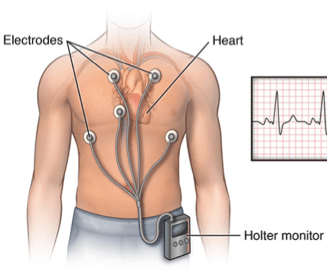
Types of tests
- 24 hours
- 48 hours
- 72 hours
- 14 days
- Loop recorder
How is the Holter monitor put in place?
The test consists of attaching electrodes on your chest to monitor your cardiac activity. The therapist may need to shave the hair off your chest in order to attach the electrodes firmly. The monitor and the electrodes are connected by wires.
You will then go home and wear the monitor for the amount of time prescribed by your doctor.
You should keep a diary of your activities and press on the “Symptom” button on the monitor when you experience symptoms. This will be explained by the therapist.
You will be responsible to remove the monitor the morning on which the test is scheduled to end. You must return the Holter monitor and your diary at the hospital’s administrative offices that same morning.
Wearing a monitor has no risks. On rare occasions a patient may develop skin irritations or swelling at the electrode sites. It takes about 15 to 30 minutes to explain and install the monitor.
What happens after wearing the Holter monitor?
The therapist will send the recordings to a cardiologist. The cardiologist will analyze it and send his report to your doctor. The results will be transmitted by your doctor.
What is a electrocardiogram?
An electrocardiogram (ECG) is a simple and painless test that measures and records the electrical activity of your heart.
An ECG is a diagnostic test that your doctor may recommend if you are experiencing abnormal heart beats or if you are having chest pain.
What should you do in preparation for the electrocardiogram?
- You do not need to restrict what you eat or drink before this test, but it is recommended that you don’t smoke just before the test
- Do not wear nylon stocking
- Do not apply cream on your body
What happens during an electrocardiogram?
The ECG technician will explain the procedure to you. You will be asked to remove all upper body clothing, and to put on a gown with the opening to the front.
The electrodes will be placed to several spots on your chest, arms, and legs. In preparation for the placing of the electrodes, the technician may have to shave any chest hair off in the area of the electrode placement. These electrodes are then connected to the ECG machine.
The technician will ask you to lie still and relax as much as you can for about five minutes. The electrodes will detect the electrical activity of your heart and the results will be recorded and printed on graph paper. You will not feel anything while this is happening. The ECG diagnostic test lasts approximately 15 minutes.
What happens after an electrocardiogram?
The technician will send your ECG to a cardiologist who will then analyze it. The cardiologist will send a report to your physician. The results will be given to you by your physician.
What is a Pulmonary Function Test (PFT)?
Pulmonary Function Tests (PFT) are breathing tests that help diagnose how well you move air in and out of your lungs and how well oxygen enters your body.
A PFT can help diagnose many respiratory conditions and can help evaluate the effectiveness of any current therapies including medications and exercise.
How can you prepare for a Pulmonary Function Test?
- You can eat a light meal two hours before your appointment
- Do not smoke 8 hours before your test
- Wear comfortable clothing
You should not take the following medications before your appointment unless you’re in an emergency, as these may affect your results:
- Ventolin, Incruse, Atrovent (May be taken up to 8 hours prior to the test)
- Accolade, Singular (May be taken up to 24 hours prior to the test)
- Oxeze, Serevent, Symbicort, Breo, Advair (May be taken up to 48 hours prior to the test)
Take all your other medications as usual unless specified otherwise by your physician.
If you have a cold, flu, or fever, contact the administration office at 705-372-2929 to cancel your appointment.
What happens during a Pulmonary Function Test?
Our PFT is a series of 4 tests that evaluate your respiratory situation.
- For the first test, you will be asked to start breathing normally by your mouth through a mouth piece that is connected to the PFT machine. You will then be asked to take a slow deep breath in, and to slowly exhale until you are fully empty. This test will be repeated 2 to 4 times.
- For the second test, you will be sitting in the PFT machine with the door closed. You will once again place your mouth on the mouth piece and breathe normally. You will then be instructed to start panting. Once you have the right rhythm, you will feel an obstruction through the mouth piece. You will keep panting for about 4 breaths. This test will be repeated 2 to 4 times.
- For the third test, you will start by breathing normally through the mouth piece. You will then take a fast deep inhalation and exhale as fast and forcefully as possible for at least 6 seconds. This test will be repeated 2 to 4 times.
- For the fourth test, you will start by breathing normally through the mouth piece. After a few breaths, you will take a deep inhalation and exhale as long as possible. Once your exhalation is done, you will take a deep breath and hold it for 8 seconds, and then you will exhale into the mouth piece. This test will be repeated 2 times.
At this point, you will be given a bronchodilator. We will wait 10 to 15 minutes for the medication to act and then we will repeat the second and the third PFT test.
What happens after a Pulmonary Function Test?
You may return to your normal activities after your Pulmonary Function Test. The Respiratory Therapist will send your report to your physician. The results will be given to you by your physician.
What is a Walking Oximetry Test?
A walking oximetry test is used to help measure oxygen levels in your blood during physical activity.
How can you prepare for a Walking Oximetry Test?
- You can eat a light meal two hours before your test
- Wear comfortable clothing
- If you use a walker, bring it with you
- Do not smoke 8 hours before your test
What happens during a Walking Oximetry Test?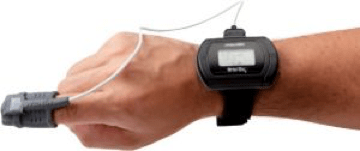
The Respiratory Therapist will connect an oximeter probe to your finger and document the percentage of oxygen in your blood and your heart rate.
You will then walk at your own pace in the hospital halls for up to six minutes with the oximeter probe on your finger.
This test will allow the Respiratory Therapist to see how the percentage of oxygen in your blood decreases as physical activity increases.
What happens after a Walking Oximetry Test?
You may return to your normal activities after a Walking Oximetry test. The Respiratory Therapist will send the report to your physician. The results will be given to you by your physician. The results will determine if you qualify for home oxygen.
This service is offered through Vital Air
Outpatients need a prescription from their doctor before communicating with Danny Mitron at the Respiratory Department at 705-372-2942 for an appointment. Please specify that the appointment consists of a Home Oxygen Assessment.
This service is also offered to hospital patients before their discharge with a doctor’s prescription.
What is a Night Study?
A Night Study is an overnight home oximetry test to monitor and record the level of oxygen in your blood as you sleep through the night.
How can you prepare for a Night Study?
Follow your normal bedtime routine at your usual time. You will add these following steps to your routine:
- Attach the oximeter probe to one of your fingers. You can wear it on either hand and on any finger except your thumb. You may remove any nail polish or artificial nail from the finger wearing the probe.
- Turn on the oximeter. Some oximeter turn on automatically while others have a power button you need to press.
You may make a note of the time you go to bed and of the time you wake up. If you get up during the night, make a note of the time. This will be explained by your Respiratory Therapist.
What happens during a Night Study?
You will leave the device on all night and you should try to sleep as usual. The oximeter will monitor and record your oxygen saturation and your heart rate.
What happens after a Night Study?
- When you wake up, turn off the oximeter and remove the probe from your finger.
- Do not remove the batteries as this will erase the results
- Return the equipment and your notes to the administration office the next morning.
The Respiratory Therapist will send your report to your physician. The results will be given to you by your physician.
What is a Night Study?
A Night Study is an overnight home oximetry test to monitor and record the level of oxygen in your blood as you sleep through the night.
How can you prepare for a Night Study?
Follow your normal bedtime routine at your usual time. You will add these following steps to your routine:
- Attach the oximeter probe to one of your fingers. You can wear it on either hand and on any finger except your thumb. You may remove any nail polish or artificial nail from the finger wearing the probe.
- Turn on the oximeter. Some oximeter turn on automatically while others have a power button you need to press.
You may make a note of the time you go to bed and of the time you wake up. If you get up during the night, make a note of the time. This will be explained by your Respiratory Therapist.
What happens during a Night Study?
You will leave the device on all night and you should try to sleep as usual. The oximeter will monitor and record your oxygen saturation and your heart rate.
What happens after a Night Study?
- When you wake up, turn off the oximeter and remove the probe from your finger.
- Do not remove the batteries as this will erase the results
- Return the equipment and your notes to the administration office the next morning.
The Respiratory Therapist will send your report to your physician. The results will be given to you by your physician.
Emergency Services
Although Hôpital Notre-Dame Hospital is a level 1 hospital, which does not provide intensive care services, we are still able to respond to an emergency with the help of our specialized equipment. We can provide:
- Mechanical Ventilation (PB 840, 7200)
- Non-Invasive Ventilation (V60 Philip, ResMed)
- High Flow oxygen system (Airvo)
Consulting Services
We provide daily consults for our inpatients that experience respiratory difficulties. Hopital Notre-Dame Hospital provides care for:
- Newborn (infant)
- Pediatric
- Adult


